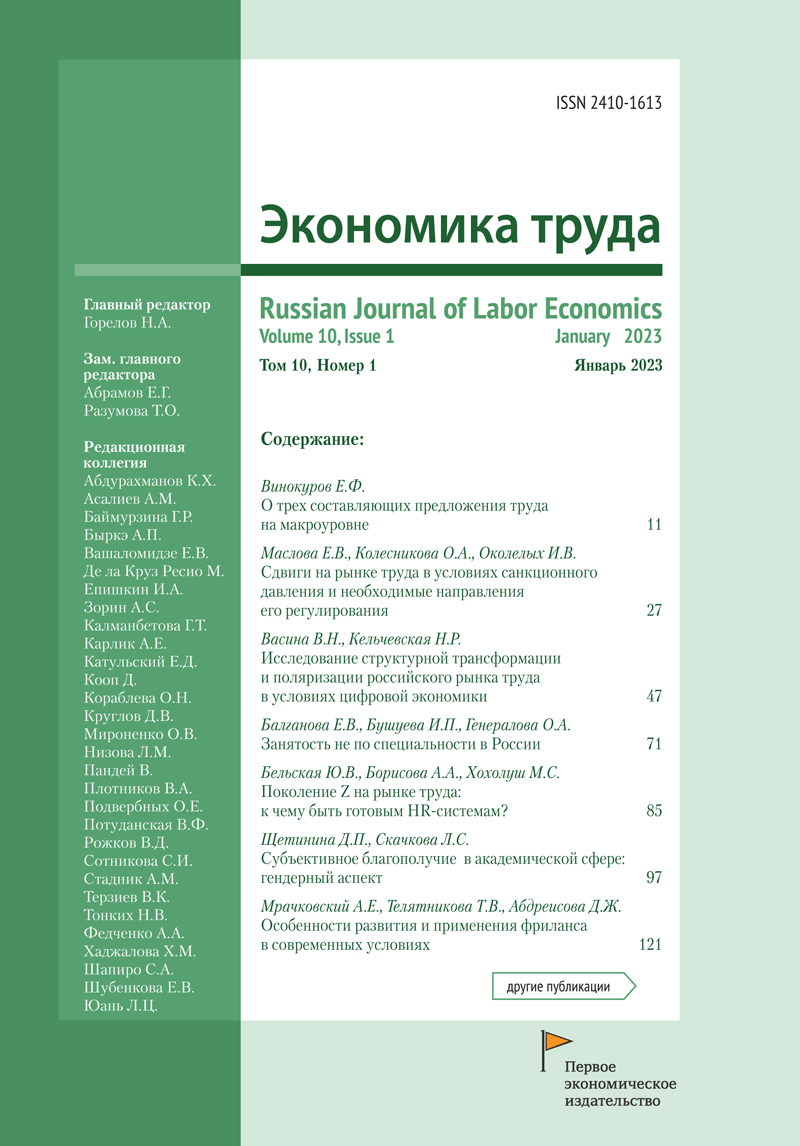Socio-economic aspects of occupational safety and health amidst digital transformation
- Authors: Gorodnova N.V.1, Samarskaya N.A.2
-
Affiliations:
- Ural Federal University named after the first President of Russia B.N.Yeltsin
- Federal State Budgetary Institution “All-Russian Scientific Research Institute of Labor” of the Ministry of Labour and Social Protection of the Russian Federation
- Issue: Vol 10, No 1 (2023)
- Pages: 191-208
- Section: Articles
- URL: https://journals.eco-vector.com/2410-1613/article/view/607790
- DOI: https://doi.org/10.18334/et.10.1.116601
- ID: 607790
Cite item
Abstract
Building a digital economy in Russia requires the implementation of digital transformation, both of individual organizations and entire industries. Important components of the changes are directly employees and employers, as well as the corporate culture. Digital transformations should be carried out on a single foundation, which is laid in the strategy aimed at digitalisation of all business processes. These aspects should be reflected in the company's mission and goals, which involve accelerating the digitalisation of business processes, including occupational safety and health system. In this regard, the study devoted to the identification of social and economic aspects of the employees' occupational safety and health in the digital environment becomes even more relevant.The research purpose is to identify the conditions, prerequisites and effects of the introduction of new digital methods and tools into the occupational safety and health system. It is concluded that digital transformation in the occupational safety and health system will allow automating occupational safety and health processes, robotizing the most dangerous areas of work, as well as reducing the accident likelihood.The practical significance of this research is to identify the expected positive effects of the external and internal processes transformation in the occupational safety and health system amidst digital transformation for companies and organizations, employees and the state.The results of the study may be useful to representatives of public authorities, specialists in occupational safety and health, as well as experts whose range of professional interests includes solving problems of improving the efficiency of occupational safety and health management.
About the authors
Natalya Vasilevna Gorodnova
Ural Federal University named after the first President of Russia B.N.Yeltsin
Email: n.v.gorodnova@urfu.ru
Nadezhda Aleksandrovna Samarskaya
Federal State Budgetary Institution “All-Russian Scientific Research Institute of Labor” of the Ministry of Labour and Social Protection of the Russian Federation
Email: samarskaya_na@mail.ru
References
- Алалван А.Р.Д., Беляев Ю.А., Смирнова А.А. Российский рынок Интернета вещей // Экономика и бизнес: теория и практика. – 2021. – c. 6-9.
- Афанасьев Д. Как искусственный интеллект меняет отношение бизнеса к покупателю // БИТ. Бизнес Информационные технологии. – 2019. – № 5(88). – c. 54-55.
- Владимирова И.Л., Барешенкова К.А. Цифровой инжиниринг в сфере закупок при реализации инвестиционно-строительных проектов // Экономика, предпринимательство и право. – 2020. – № 2. – c. 377-394. – doi: 10.18334/epp.10.2.100493.
- Городнова Н.В. Развитие цифровой экономики: теория и практика // Вопросы инновационной экономики. – 2021. – № 3. – c. 911-928. – doi: 10.18334/vinec.11.3.112227.
- Кокуйцева Т.В., Овчинникова О.П. Методические подходы к оценке эффективности цифровой трансформации предприятий высокотехнологичных отраслей промышленности // Креативная экономика. – 2021. – № 6. – c. 2413-2430. – doi: 10.18334/ce.15.6.112192.
- Медяник Ю.В. Совершенствование системы инжиниринга инвестиционно-строительной деятельности // Вопросы инновационной экономики. – 2019. – № 2. – c. 501-514. – doi: 10.18334/vinec.9.2.40704.
- Разинкина И.В., Лазарев Н.В. Инновационная деятельность в условиях цифровой экономики // Креативная экономика. – 2020. – № 11. – c. 2757-2772. – doi: 10.18334/ce.14.11.111081.
- Самарская Н.А. Трансформация охраны труда в условиях цифровой экономики // Экономика труда. – 2022. – № 2. – c. 333-348. – doi: 10.18334/et.9.2.114261.
- Самарская Н.А., Ильин С.М. Нормативно-правовое обеспечение охраны труда в Российской Федерации в условиях цифровизации экономики // Экономика труда. – 2021. – № 9. – c. 1039-1054. – doi: 10.18334/et.8.9.113563.
- Сумикова И.П. Промышленный интернет вещей: перспективы и риски использования в производстве // Актуальные научные исследования в современном мире. – 2021. – № 11-8(78). – c. 155-159.
- Тагаров Б.Ж. Цифровой кластер как новая форма экономической концепции // Креативная экономика. – 2021. – № 2. – c. 327-340. – doi: 10.18334/ce.15.2.111726.
- Хэ Я. Промышленный интернет – фундамент глобальных цифровых бизнес-моделей // Управление. – 2022. – № 31. – c. 61-62.
- Цыгляну П.П., Василенко Н.В. Мировой и российский рынки инжиниринговых услуг в нефтегазовом секторе: перспективы и ограничения развития // Вопросы инновационной экономики. – 2021. – № 4. – c. 1921-1936. – doi: 10.18334/vinec.11.4.114016.
- Чаадаев К.В. Методология реинжиниринга бизнес-процессов // Экономика, предпринимательство и право. – 2020. – № 3. – c. 587-600. – doi: 10.18334/epp.10.3.100725.
- Шеве Г., Хюзиг С., Гумерова Г.И., Шаймиева Э.Ш. Индустрия 4.0 (Германия). Промышленный интернет вещей (Industrial Internet of Things) (США): разграничение понятий // Инвестиции в России. – 2019. – № 11(298). – c. 3-8.
- Alguliev R.M., Fataliev T. Kh., Mehdiyev Sh.A. The Industrial Internet of Things: the evolution of automation in the oil and gas complex // SOCAR Proceedings. – 2019. – № 2. – p. 66-71. – doi: 10.5510/OGP20190200391.
Supplementary files









